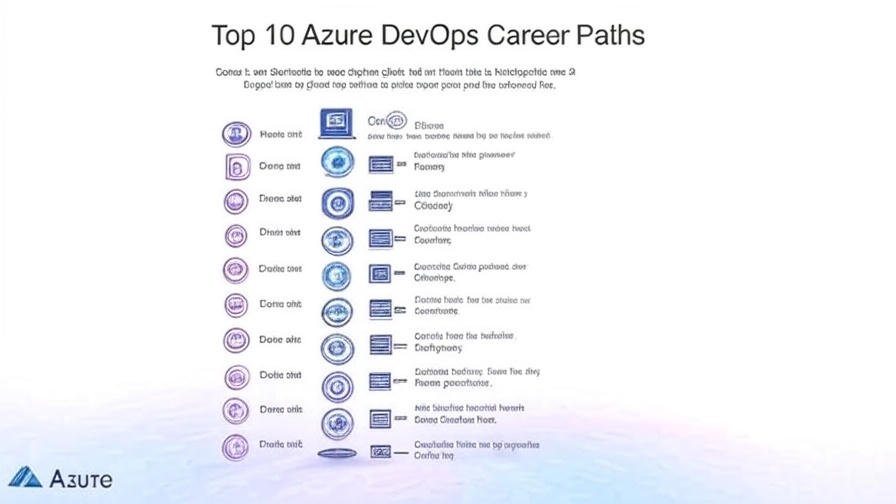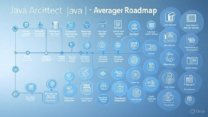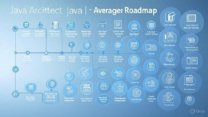
Explore the Top 10 Azure DevOps Career Paths for Your Future
Top 10 Azure DevOps Career Paths to Explore
In the rapidly evolving world of technology, Azure DevOps has emerged as a critical tool for organizations aiming to streamline their software development and IT operations. As businesses increasingly adopt DevOps practices, the demand for skilled professionals in this field is soaring. Exploring the top Azure DevOps career paths can open up a plethora of opportunities for IT professionals. Whether you are just starting out or looking to advance your career, understanding these paths can help you make informed decisions. For those new to the field, consider enrolling in azure devops training to build a strong foundation.
1. DevOps Engineer
Overview
A DevOps Engineer plays a pivotal role in bridging the gap between development and operations teams. They are responsible for implementing and managing continuous integration and continuous deployment (CI/CD) pipelines, ensuring seamless software delivery.
Skills Required
- Proficiency in Azure DevOps tools
- Knowledge of scripting languages like Python, PowerShell, or Bash
- Experience with containerization technologies like Docker and Kubernetes
- Understanding of cloud services, particularly Microsoft Azure
Career Prospects
DevOps Engineers are in high demand across various industries. With experience, they can advance to roles such as Senior DevOps Engineer, DevOps Architect, or even move into managerial positions.
2. Azure DevOps Architect
Overview
An Azure DevOps Architect designs and implements DevOps practices and tools within an organization. They work closely with stakeholders to understand business requirements and develop strategies to optimize the software development lifecycle.
Skills Required
- Extensive experience with Azure DevOps tools and services
- Strong understanding of software development methodologies
- Excellent problem-solving and communication skills
- Knowledge of security and compliance best practices
Career Prospects
Azure DevOps Architects are crucial for organizations looking to scale their DevOps practices. They can progress to higher-level architectural roles or transition into executive positions such as Chief Technology Officer (CTO).
3. Release Manager
Overview
A Release Manager oversees the release of software products, ensuring that they are delivered on time and meet quality standards. They coordinate with development, testing, and operations teams to manage the release process.
Skills Required
- Experience with release management tools and processes
- Strong organizational and project management skills
- Knowledge of CI/CD pipelines
- Understanding of risk management and mitigation strategies
Career Prospects
Release Managers play a vital role in the software development lifecycle. With experience, they can advance to roles such as Senior Release Manager, Program Manager, or even move into DevOps engineering positions.
4. Automation Engineer
Overview
An Automation Engineer focuses on automating repetitive tasks and processes within the software development lifecycle. They develop scripts and tools to improve efficiency and reduce manual effort.
Skills Required
- Proficiency in scripting languages like Python, PowerShell, or Bash
- Experience with automation tools and frameworks
- Knowledge of CI/CD pipelines
- Understanding of cloud services and infrastructure as code (IaC)
Career Prospects
Automation Engineers are essential for organizations looking to improve their DevOps practices. They can advance to roles such as Senior Automation Engineer, DevOps Engineer, or even move into architectural positions.
5. Security Engineer
Overview
A Security Engineer specializes in ensuring the security of software applications and infrastructure. They implement security best practices and tools to protect against threats and vulnerabilities.
Skills Required
- Knowledge of security tools and technologies
- Understanding of security best practices and compliance standards
- Experience with threat modeling and risk assessment
- Proficiency in scripting languages and automation tools
Career Prospects
Security Engineers are in high demand as organizations prioritize security in their DevOps practices. They can advance to roles such as Senior Security Engineer, Security Architect, or even move into managerial positions.
6. Cloud Engineer
Overview
A Cloud Engineer focuses on designing, implementing, and managing cloud infrastructure and services. They work closely with development and operations teams to ensure seamless integration and deployment of cloud-based solutions.
Skills Required
- Proficiency in cloud services, particularly Microsoft Azure
- Knowledge of infrastructure as code (IaC) tools like Terraform and Ansible
- Experience with containerization technologies like Docker and Kubernetes
- Understanding of CI/CD pipelines and DevOps practices
Career Prospects
Cloud Engineers are essential for organizations adopting cloud technologies. They can advance to roles such as Senior Cloud Engineer, Cloud Architect, or even move into DevOps engineering positions.
7. Site Reliability Engineer (SRE)
Overview
A Site Reliability Engineer (SRE) focuses on ensuring the reliability and performance of software applications and infrastructure. They implement monitoring and alerting tools to detect and resolve issues proactively.
Skills Required
- Proficiency in monitoring and alerting tools
- Knowledge of CI/CD pipelines and DevOps practices
- Experience with scripting languages and automation tools
- Understanding of cloud services and infrastructure as code (IaC)
Career Prospects
SREs are crucial for organizations looking to improve the reliability of their software applications. They can advance to roles such as Senior SRE, DevOps Engineer, or even move into architectural positions.
8. Data Engineer
Overview
A Data Engineer focuses on designing, implementing, and managing data pipelines and infrastructure. They work closely with data scientists and analysts to ensure seamless data integration and processing.
Skills Required
- Proficiency in data engineering tools and technologies
- Knowledge of CI/CD pipelines and DevOps practices
- Experience with cloud services and infrastructure as code (IaC)
- Understanding of data modeling and database design
Career Prospects
Data Engineers are in high demand as organizations prioritize data-driven decision-making. They can advance to roles such as Senior Data Engineer, Data Architect, or even move into managerial positions.
9. Software Developer
Overview
A Software Developer focuses on designing, developing, and maintaining software applications. They work closely with DevOps teams to ensure seamless integration and deployment of software solutions.
Skills Required
- Proficiency in programming languages like C#, Java, or Python
- Knowledge of CI/CD pipelines and DevOps practices
- Experience with cloud services and infrastructure as code (IaC)
- Understanding of software development methodologies
Career Prospects
Software Developers are essential for organizations looking to develop and maintain software applications. They can advance to roles such as Senior Software Developer, Software Architect, or even move into DevOps engineering positions.
10. Technical Evangelist
Overview
A Technical Evangelist focuses on promoting and advocating for DevOps practices and tools within an organization. They work closely with stakeholders to understand business requirements and develop strategies to optimize the software development lifecycle.
Skills Required
- Extensive experience with Azure DevOps tools and services
- Strong understanding of software development methodologies
- Excellent communication and presentation skills
- Knowledge of security and compliance best practices
Career Prospects
Technical Evangelists play a vital role in promoting DevOps practices within organizations. They can advance to roles such as Senior Technical Evangelist, DevOps Architect, or even move into executive positions.
Exploring these top Azure DevOps career paths can provide valuable insights into the various opportunities available in this field. Whether you are just starting out or looking to advance your career, understanding these paths can help you make informed decisions and achieve your professional goals.
### Frequently Asked Questions
What is the role of a DevOps Engineer?
A DevOps Engineer bridges the gap between development and operations teams, implementing and managing CI/CD pipelines to ensure seamless software delivery.
What skills are required for an Azure DevOps Architect?
An Azure DevOps Architect needs extensive experience with Azure DevOps tools, a strong understanding of software development methodologies, excellent problem-solving and communication skills, and knowledge of security and compliance best practices.
What does a Release Manager do?
A Release Manager oversees the release of software products, coordinating with development, testing, and operations teams to ensure timely and high-quality software delivery.
What are the key responsibilities of an Automation Engineer?
An Automation Engineer focuses on automating repetitive tasks and processes within the software development lifecycle, developing scripts and tools to improve efficiency and reduce manual effort.
Why is the role of a Security Engineer important in DevOps?
A Security Engineer ensures the security of software applications and infrastructure, implementing security best practices and tools to protect against threats and vulnerabilities, which is crucial in DevOps practices.
What does a Cloud Engineer do?
A Cloud Engineer designs, implements, and manages cloud infrastructure and services, working closely with development and operations teams to ensure seamless integration and deployment of cloud-based solutions.
What is the role of a Site Reliability Engineer (SRE)?
A Site Reliability Engineer (SRE) ensures the reliability and performance of software applications and infrastructure by implementing monitoring and alerting tools to detect and resolve issues proactively.
What are the responsibilities of a Data Engineer in DevOps?
A Data Engineer designs, implements, and manages data pipelines and infrastructure, working closely with data scientists and analysts to ensure seamless data integration and processing.
How does a Software Developer contribute to DevOps?
A Software Developer designs, develops, and maintains software applications, working closely with DevOps teams to ensure seamless integration and deployment of software solutions.
What is the role of a Technical Evangelist in DevOps?
A Technical Evangelist promotes and advocates for DevOps practices and tools within an organization, working closely with stakeholders to understand business requirements and develop strategies to optimize the software development lifecycle.








